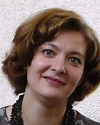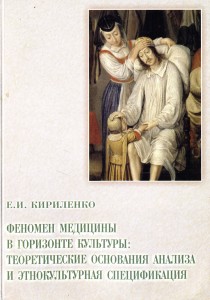© 2013 Ju.A.Isaeva
2013 – № 2 (6)
 Key words: mapping medical-anthropological ideas, epistemological search, research methodology, medicine as system, human corporality.
Key words: mapping medical-anthropological ideas, epistemological search, research methodology, medicine as system, human corporality.
Abstract: In this review the author analyses the book of a Russian researcher Elena Kirilenko as an illustrative work of mapping out the key concepts that appeared at the intersection of medical anthropology and philosophy of medicine. Briefly stating the contents of the book, the reviewer (following the author of the book) underlines the necessity to take a reflexive and systematic approach in studying various socio-cultural practices of health maintenance.
(Kirilenko E. (2008) ‘Phenomenon of medicine in the framework of culture: theoretical and ethnocultural aspects’, Tomsk: Publishing house IOA SO RAN: a review)
 The book of Elena Kirilenko, a professor of Siberian State Medical University (Tomsk), outlines the main stages in epistemological searches for conceptualising human corporeality and medicine as a system that constantly and directly deals with human flesh.
The book of Elena Kirilenko, a professor of Siberian State Medical University (Tomsk), outlines the main stages in epistemological searches for conceptualising human corporeality and medicine as a system that constantly and directly deals with human flesh.
Trying to “inhabit’ the new space Elena Kirilenko sets up landmarks first in the realm of philosophy, and then moves to ethnography and linguistics, which is reflected in two sections of the book “The phenomenon of medicine in modern culture and philosophical reflection” and “Cultural practicum: medical aspects of Russian-Slavic life-world”.
The first section deals with ideas of French philosophers, such as Michelle Foucault, Gaston Bachelard and Maurice Merleau-Ponty. The same attention to French intellectual thought can be traced in the second section of the book. The author uses the ideas of the ‘archeologist of knowledge’ as the Ariadne’s thread in order not to get lost in the labyrinth of philosophical and scientific reflections. She maps out the ideas of ethnographers and linguists related to Slavic understanding of the human body, medical experience and direct participants of healing practices. In the chapters ‘Mythology of the body in Russian-Slavic tradition’ and ‘Mytho-ritual complex and medicine’ Elena Kirilenko addresses the works of the end of 19th – beginning of 20th centuries, leaving unexamined later works on folk and traditional medicines. The last two chapters (‘Medical experience in the mirror of language’ and ‘Linguo-semantic analysis of medical discourse’) she reconstructs the body image, concepts of health and disease, as well as portrays of the sick and doctors using linguistic data that brings a special flavor to this book and without doubt attracts readers’ attention.
Please read the full version of the article in Russian.